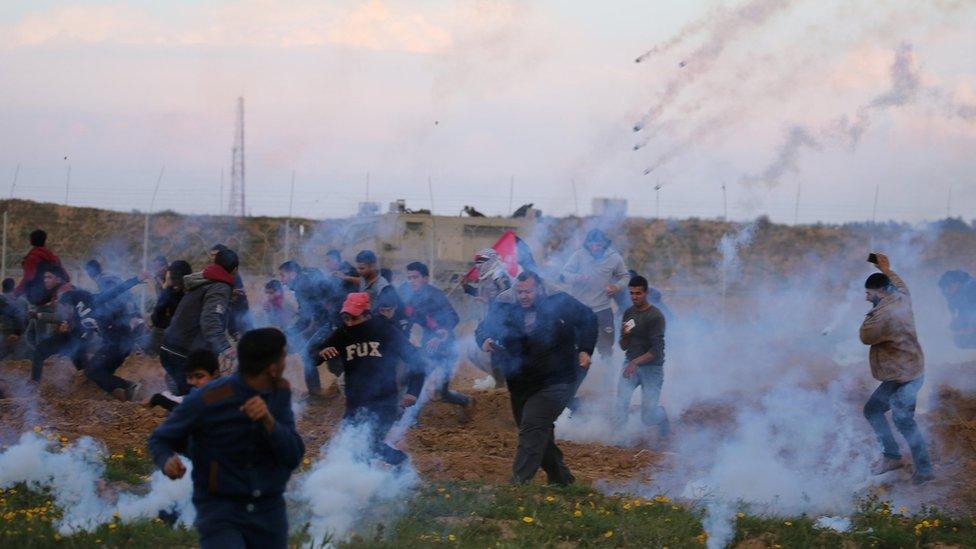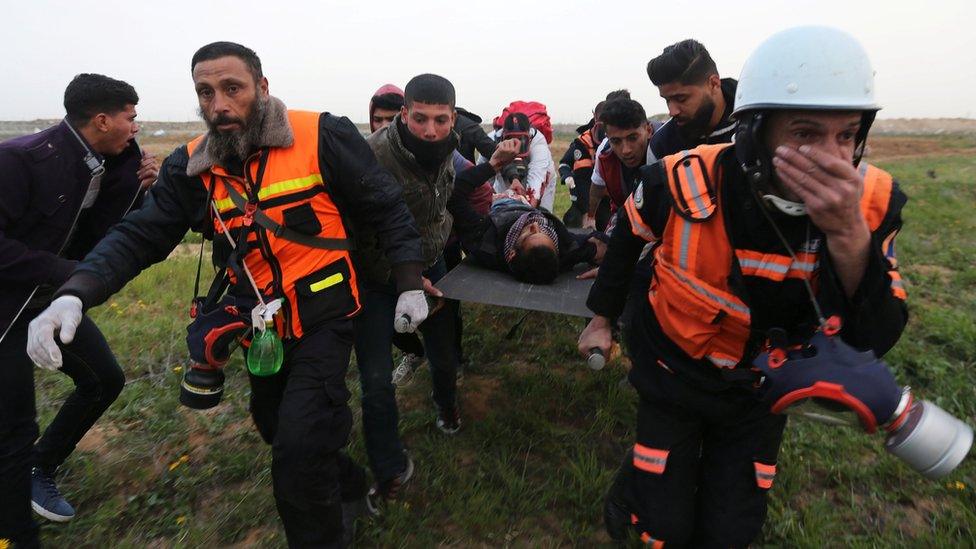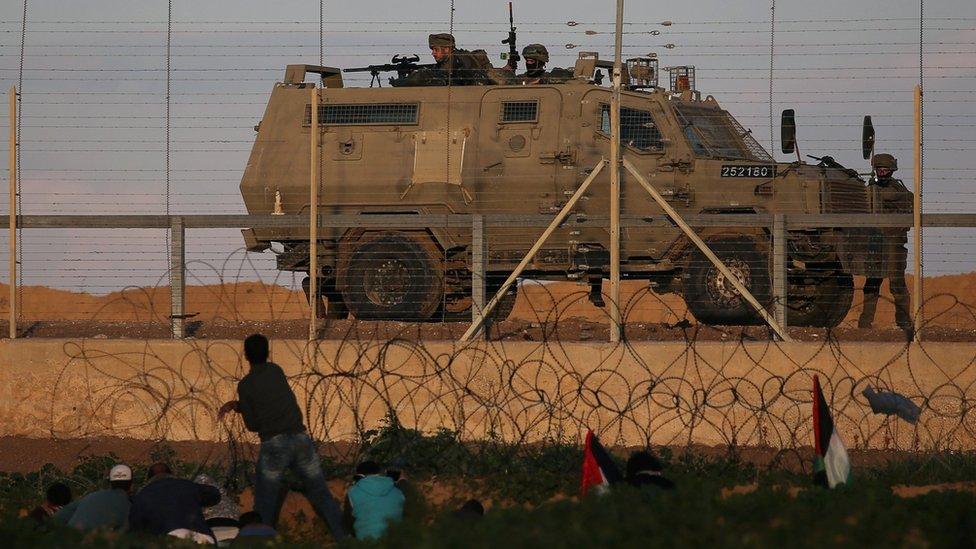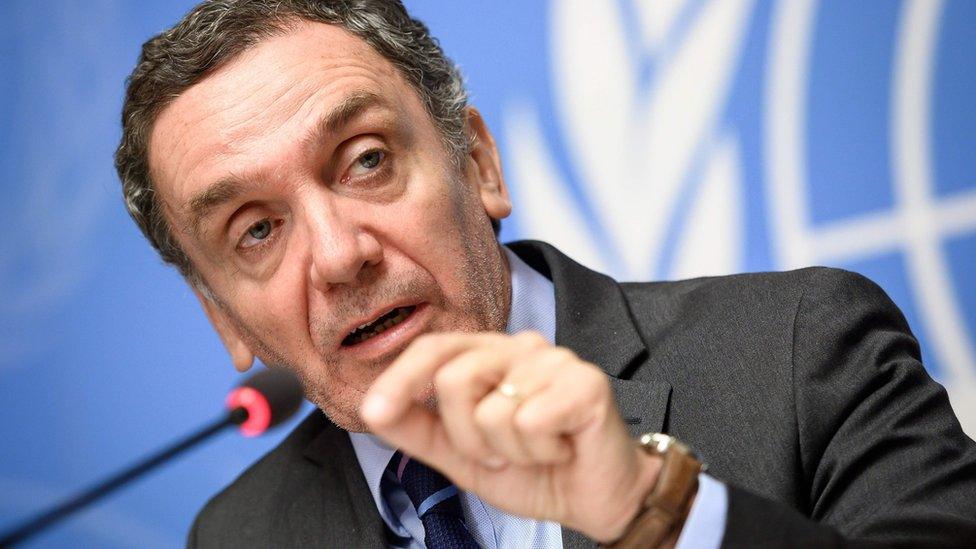Gaza protest deaths: Israel may have committed war crimes - UN
- Published

The protesters demanded that Palestinian refugees be given the right of return
Israeli soldiers may have committed war crimes while responding to Palestinian protests on the Gaza border last year, UN human rights experts have said.
A commission of inquiry investigated the killing of 189 Palestinians between 30 March and 31 December 2018.
It found reasonable grounds to believe that Israeli snipers shot at children, medics and journalists, external, even though they were clearly recognisable as such.
Israel's acting foreign minister said it rejected the findings outright.
"The Human Rights Council's Theatre of the Absurd has once again produced a report that is hostile, mendacious and biased against Israel," Israel Katz said, external.
"No-one can deny Israel the right to self-defence and the obligation to protect its citizens and its borders against violent attacks."
Palestinians have been taking part in protests along the border since last March as part of a campaign, dubbed "the Great March of Return", in support of the declared right of Palestinian refugees to return to their ancestral homes in what is now Israel.
The campaign has been organised by the militant Hamas movement - which dominates Gaza and is designated a terrorist group by Israel - and other groups.

Palestinian health officials say thousands of protesters have been hit by live rounds
The Israeli government said terrorists wanted to use the protests as cover to cross into its territory and carry out attacks. It deployed soldiers along the border fence, who it said were ordered to resort to live fire only when absolutely necessary and when there was an imminent threat.
The commission of inquiry, which was set up by the UN Human Rights Council in May, said on Thursday that more than 6,000 unarmed demonstrators were shot by military snipers at designated protest sites over nine months.
It investigated the deaths of 189 Palestinians at the sites on official protest days and found that Israeli forces had killed 183 with live ammunition. Thirty-five of the fatalities were children, while three were clearly marked paramedics, and two were clearly marked journalists, the commission found.
The BBC's Paul Adams on the issues at the root of the conflict in Gaza
Israeli forces also injured 6,106 Palestinians with live ammunition during the same period, according to the commission's data analysis. Another 3,098 were injured by bullet fragmentation, rubber-coated metal bullets or by tear-gas canisters.
Four Israeli soldiers were injured at the demonstrations. One Israeli soldier was killed on a protest day but outside the protest sites, the commission said.
Unless undertaken lawfully in self-defence, intentionally shooting a civilian not directly participating in hostilities is a war crime.

Israeli soldiers have been deployed on the Israeli side of the frontier during the protests
The commission said it "found reasonable grounds to believe that individual members of the Israeli security forces, in the course of their response to the demonstrations, killed and injured civilians who were neither directly participating in hostilities nor posing an imminent threat".
"These serious human rights and humanitarian law violations may constitute war crimes or crimes against humanity," it added.
Sara Hossain, a Bangladeshi lawyer and a member of the commission, said: "We are saying that they have intentionally shot children. They have intentionally shot people with disabilities. They have intentionally shot journalists.
"A double amputee in a wheelchair, a person using crutches... they have been shot at by snipers, who also have spotters available with them who have very high-level technology to see who is out there in the field."

Santiago Canton, chair of the commission, called on Israel to investigate every killing
The commission said it took note of the Israel's assertion that the protests masked "terror activities" by Palestinian armed groups, and also that some demonstrators were members of armed groups.
However, it concluded the demonstrations were "civilian in nature", with clearly stated political aims, and that despite some acts of significant violence they did not constitute combat or military campaigns.
That meant Israeli forces were required to operate according to the international legal framework applicable to police and other law enforcement officials, which is part of international human rights law, external.
How kites and balloons became militant weapons
The commission also found that organisers of the protests had encouraged people to fly incendiary kites and balloons over the border, causing fear among Israeli civilians and significant damage to property in southern Israel, and that Hamas had failed to prevent these acts.
"The onus is now on Israel to investigate every protest-related killing and injury, promptly, impartially and independently in accordance with international standards, to determine whether war crimes or crimes against humanity were committed, with a view to holding accountable those found responsible", said Santiago Canton, the Argentine chairman of the commission.
"We also urge the organisers, the demonstrators, and the de facto authorities in Gaza, to ensure that the Great March of Return is entirely peaceful, as it is intended to be," he added.
Palestinian Authority President Mahmoud Abbas said the findings proved "what we have always said - that Israel is committing war crimes against our people".
He urged the International Criminal Court at The Hague to "move immediately" and open a full investigation.
Hamas also called for Israeli forces to be held accountable.